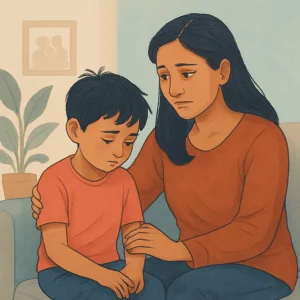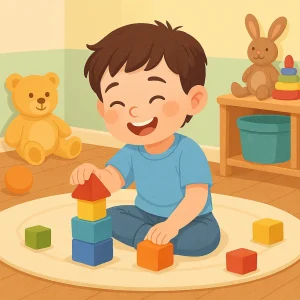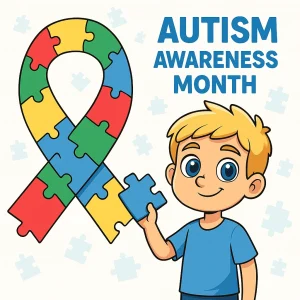Why Do Some Kids Repeat Words or Phrases?
Last Updated: April 8, 2025
Have you ever noticed a child repeating the same word or phrase over and over? It’s a common occurrence that can leave parents and caregivers puzzled. This behavior is not just a quirky phase; it’s often a part of a child’s developmental journey, and sometimes, it flags certain speech and language challenges.
At Wellness Hub, we specialize in understanding and nurturing child speech development, providing tailored support and resources to help every child achieve effective communication skills. Our approach at Wellness Hub is rooted in professional expertise and a compassionate understanding of the unique paths children take as they learn to speak and interact with the world around them.
Understanding Echolalia and Repetitive Speech
What Is Echolalia?
Echolalia might sound like a complex term, but it simply refers to the repetition of phrases or noises that children (and sometimes adults) hear from others or in their environment. In child development, echolalia is often observed as a natural part of learning language. It can occur when children are learning to form their language skills and are practicing the sounds and rhythms of speech they hear around them.
For many children, echoing words or phrases is a stepping stone in language development. It allows them to experiment with sounds, practice language, and eventually, understand the use of words in context. However, it’s not just a mimic game; echolalia can also serve as a communication tool for children who might find direct expression challenging.
Also read: What is Echolalia? Why Some Autistic Children Repeat Words
Common Reasons Kids Repeat Words
- Learning and Experimentation: Just as toddlers take their first wobbly steps, they also make their initial attempts at speaking by repeating sounds and words they hear. This repetition helps them learn the language structure and acquire new vocabulary.
- Cognitive Processing: For some children, repeating words or phrases is a way to process information. It gives them extra time to comprehend what is said and respond appropriately. Think of it as hitting the ‘repeat’ button while trying to understand a new song’s lyrics.
- Seeking Comfort and Assurance: Repetitive speech can be comforting to children, especially in new or overwhelming situations. When faced with the unfamiliar, repeating known words or phrases can provide a sense of security and stability.
- Communication Needs: In cases where children have communication difficulties, such as those seen in autism spectrum disorders, echolalia can be more pronounced. Here, repetition might not only be a learning tool but also a functional way to interact. Children might use phrases they’ve memorized to participate in conversations even if they don’t fully understand the usage, which points to the need for supportive speech therapy strategies offered by professionals at facilities like Wellness Hub.
- Attention and Interaction: Sometimes, children repeat words simply to catch an adult’s attention or as a part of playful interaction. It’s their way of engaging others in their learning process or showing that they are keen observers of their surroundings.
Exploring the Causes of Repetitive Speech in Children
Repetitive speech in children can be puzzling and sometimes concerning for parents and caregivers. Understanding why some children engage in this behavior is crucial to providing the right support. Below, we delve into the various causes, from neurological factors to behavioral strategies, that might lead a child to repeat words or phrases.
Learn more: 10 Simple Ways to Support a Child with Echolalia
Neurological Factors
The development of a child’s brain plays a significant role in their language skills and can sometimes lead to repetitive speech. Neurological development involves the brain’s ability to process auditory information and then produce speech. In some children, delays or differences in this development can manifest as repetitive speech as they try to master language skills. This repetition helps them to reinforce neural pathways, making the processing of language easier over time.
Autism Spectrum Disorders
For children with autism spectrum disorders (ASD), repetitive speech or echolalia is a common trait. It’s often used as a coping mechanism to manage sensory overload or to communicate needs when conventional speech is challenging. Echolalia in ASD can range from immediate repetition, like echoing a question rather than answering it, to delayed repetition, where a child repeats a phrase heard earlier at a different time. Understanding this pattern is crucial for tailoring effective communication strategies and therapies, which are specialties at centers like Wellness Hub.
Anxiety and Stress
Emotional stressors can also trigger repetitive speech patterns in children. In times of anxiety or stress, children might find comfort in the familiarity of repeated words or phrases—it’s their way of self-soothing. This repetitive speech can act like a verbal stabilizer, helping them to regain a sense of control in uncertain situations.
Language Processing Challenges
Some children face challenges in processing language, which can lead to the repetition of words or phrases as they attempt to understand and internalize language. These processing difficulties mean that a child might need more time to think about what is being said, leading to repetitions as they decode and comprehend spoken language.
Developmental Milestones
Repetitive speech isn’t always a sign of a problem. For many children, repeating phrases or words is a part of normal language development. As children experiment with sounds and words, they often repeat what they hear as a way to practice and perfect their speech. This phase is typical in the early stages of language acquisition.
Attention-Seeking Behavior
Children often repeat words or phrases as a strategy to gain attention from adults or peers. This can be a way of interacting or simply ensuring that they are being noticed and included. Understanding this motive can help parents and educators respond appropriately, reinforcing positive communication habits.
Understanding Causes of Repetitive Speech
| Cause | Description | Common in Age | How to Support |
|---|---|---|---|
| Neurological Factors | Brain development impacts language processing, leading to repetition. | 1-3 years | Patience and reinforcement in communication. |
| Autism Spectrum Disorders | Uses repetition as a coping mechanism for sensory processing or communication. | Any age | Specialized therapies and patient communication strategies. |
| Anxiety and Stress | Uses repetition for comfort and control during stress. | Any age | Supportive and reassuring environment. |
| Language Processing Challenges | Difficulty in understanding language leads to repetition. | 2-5 years | Language development activities and simplified instructions. |
| Developmental Milestones | Normal part of learning language, using repetition for practice. | 1-3 years | Encouragement and exposure to varied vocabulary. |
| Attention-Seeking Behavior | Repeats words to gain attention or interact. | 2-6 years | Positive reinforcement and engaging communication. |
Conclusion
Understanding why kids repeat words is key to supporting their speech development. Whether it’s due to learning new sounds, managing emotions, or dealing with challenges like autism, Wellness Hub offers expert guidance and therapy options tailored for each child. Our resources help parents and caregivers make sense of repetitive speech and find the best ways to encourage clear communication. Visit our speech therapy resources for more information and start your journey toward effective communication today. Together, we can ensure every child’s voice is heard and nurtured at Wellness Hub.
Frequently Asked Questions:
1. What causes a child to repeat words constantly?
Children often repeat words as part of their language development. This can be due to them practicing new words, processing information, or it might indicate a condition like autism. Consulting a speech therapist can help if the repetition seems excessive or unusual.
2. Is it normal for toddlers to repeat themselves?
Yes, it is normal for toddlers to repeat words and phrases as they learn to speak. This repetition helps them to practice language skills and solidify their understanding. However, if repetition continues past expected developmental stages, a check-up might be needed.
3. How do I know if my child’s repetitive speech is a problem?
Repetitive speech becomes a concern if it persists as the child grows older than typical language development milestones or if it impedes their daily communication. In such cases, seeking advice from a speech-language pathologist can provide guidance and support.
4. Can repeating phrases be a sign of autism?
Repetitive speech, such as echolalia, is a common characteristic in children with autism, used for processing or communication. If a child frequently repeats phrases without context, it may warrant an evaluation for autism spectrum disorders.
5. What should I do if my child keeps repeating the same words?
If repetition is frequent, try to engage and expand on conversations with your child to encourage more diverse language use. If concerns persist, consider consulting with a speech therapist to explore underlying issues and strategies for improvement.
6. How can speech therapy help with repetitive speech?
Speech therapy helps by assessing the reasons behind repetitive speech and employing techniques to enhance language comprehension and usage. Therapists provide tailored activities that encourage more effective communication skills.
7. When should I be concerned about echolalia?
Echolalia should decrease as normal language development progresses. If your child’s echolalia is persistent, disrupting communication, or if they are not meeting language milestones, it might be time to seek professional advice.
8. What are some strategies to reduce repetitive speech in children?
Reducing repetitive speech can be approached by gently correcting your child, providing them with correct phrases, and using engaging activities that promote language diversity. Visual aids and consistent social interaction can also support communication development.
9. Can stress cause a child to repeat words?
Yes, children might use repetitive speech as a coping mechanism during stressful situations. This repetition provides a sense of control and comfort. Addressing the root of their stress and providing a supportive environment are key to helping them.
10. Where can I find resources for supporting my child’s speech development?
Resources for speech development can be found at Wellness Hub dedicated speech therapy section. This site offers a range of tools and professional guidance to support children at various stages of speech development, from basic skills to more complex needs.
About the Author:
Shravanaveena Gajula
M.Sc ., Speech and Language Pathology (5+ years of experience)
Shravanaveena Gajula is a dedicated Audiologist and Speech-Language Pathologist with a BASLP and an M.Sc in Speech and Language Pathology. With experience spanning multiple settings, including Wellness Hub and Ashray Akruti, Veena specializes in a wide range of disorders from developmental issues in children to speech and language assessments in adults. Her expertise includes parent counseling, managing speech sound and fluency disorders, and creating individualized therapy programs. Veena is also PROMPT certified and an author of several insightful blogs on speech and language pathology, aiming to educate and assist caregivers in supporting their loved ones.
Book your Free Consultation Today
Parent/Caregiver Info:
Client’s Details:
* Error Message








